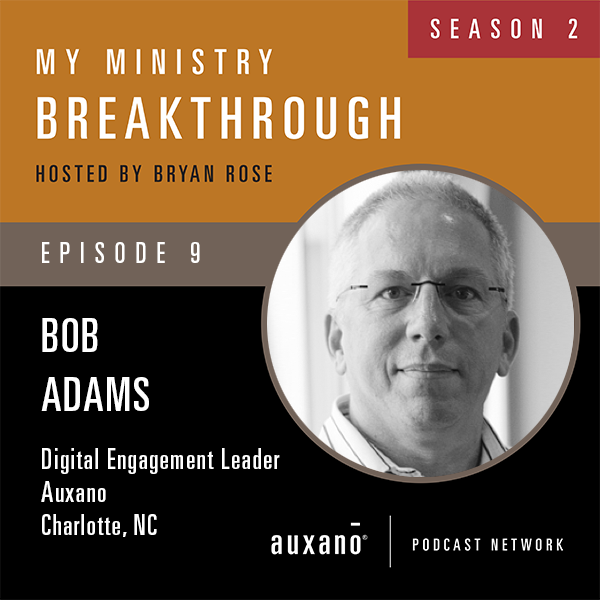2_09: Bob Adams – A masterclass on reading for a new decade of church leadership
Breakthrough ideas with Bob:
- Reading becomes caught more than taught, a practice handed down generation to generation.
- Reading will help you learn critical thinking skills. Critical thinking skills are an essential part of leadership.
- Then a seminary professor, Al Mohler, always talked about critical thinking and reading in leadership terms.
- Leadership, at its very core it about critical thinking… reading, whether it’s from books or magazines, even online browsing, it is going to be the foundation of critical thinking.
- Why reading is so essential in the life of a church leader
- An expert on reading books and helping others read books well.
- Pastors have big libraries. But I would venture to say their libraries are full of books they haven’t read or haven’t read cover to cover.
- The original idea of SUMS was to produce a book summary that was a summary. We do author-based permission about 2,000, 2,500 words.
- Book reading happens in one of four ways: elementary, inspectional, analytical, or syntopical.
- Elementary reading is reading for what the book says. You’re not getting very deep into it. It is what it is.
- Elementary reading forms the fundamental level of reading.
- Inspectional reading is reading by answering the question, “What is the book about?”
- Inspectional reading seeks to understand more about what’s behind the whole theme or concept.
- Analytical reading is reading by answering the question, “What does the book mean?”
- Analytical reading always involves asking questions and taking notes.
- In analytical reading, you’re having a conversation with the author.
- Analytical reading usually happens in the kind of books that you come back to again and again over the years.
- Syntopical reading is reading that examines how a particular book compares with other books about the same topic?
- Everyone must make time to read.
- Reading is a deliberate practice.
- If you want to learn to read, you’ve got to stop doing something else.
- You have to make a deliberate practice of reading every day, preferably on your calendar.
- Make a deliberate practice to stop doing something so you can start reading.
- If you’re doing things to increase your leadership capacity, you’re probably going to be doing analytical reading.
- Michael Hyatt created a reading journal for individual books where he takes a one or two page summary of the book.
- Leaders should read fiction books because they allow exploration of other worlds one would ordinarily go.
- There are books, there are good books, and there are great books.
- The benefit of reading #1 – Reading builds a connection between your brain synapses.
- The benefit of reading #2 – Reading reduces stress by being a mental pressure relief valve.
- The benefit of reading #3 – Reading increases knowledge at all levels.
- The benefit of reading #4 – Reading expands your vocabulary.
- The benefit of reading #5 – Reading makes you a better writer.
- The benefit of reading #6 – Reading supports the skills to be an analytical thinker.
- The benefit of reading #7 – Reading builds focus.
- Some studies indicate that reading 10 to 30 minutes in the morning before you begin your regular workday brings better focus.
- The benefit of reading #8 – Reading makes you a better speaker
- The benefit of reading #9 – Reading stimulates your mind.
- The benefit of reading #10 – Reading doesn’t have to cost you anything.
- The goal a reader seeks, be it information, entertainment, or understanding, determines the way he reads.
- A good book is one thing, but a great book begs engagement again and again.
- The people that you’re working with are more important than any process or project or whatever you think you’re trying to do.
- You can borrow the book, but you get to keep the ideas.
Breakthrough resources in this episode:
How to Read a Book by Mortimer Adler
Bob’s writing at guestsexperiencedesign.com
Missional Renaissance: Changing the Scorecard for the Church by Reggie McNeal
Michael Hyatt’s Book InSIGHTS reading journal
Bob is passionate about helping church leaders understand the importance of the guest experience in their church. For over 36 years, he has served the church in various capacities, working with hundreds of churches in developing a guest experience ministry. Bob has a unique ability to translate the corporate world of customer service to an amazing guest experience for the church. Bob facilitates a network of Connection Pastors and Guest Experience Directors from churches across the country.
Bob also serves as Auxano’s Vision Room Curator and Digital Engagement Leader. His education includes a Bachelor of Science in Business Administration from Tennessee Technological University, a Master of Religious Education from the Southern Baptist Theological Seminary, and post-graduate work in Church Business Administration from the Candler School of Theology at Emory University. Bob lives in Huntersville, NC, with his wife, Anita. Their immediate family includes four adult children, three daughters-in-law, one son-in-law, and four grandchildren.

Podcast: Play in new window | Download
Subscribe: Apple Podcasts | RSS | More